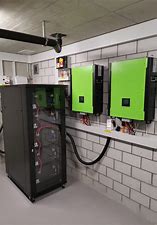Solar Charged Battery
Economic Efficiency and Service Life of a Home Solar Charged Battery and Why It Is Worthwhile
A solar charged battery for a home photovoltaic system (PV system) are similar to car battery in the way it works. It can store electricity and also release it again. But the term battery has become generally accepted. That is why these devices are also called home solar batteries or residential solar batteries.
A photovoltaic system only generates electricity when the sun is shining. The highest production is around midday. At this time, however, a normal household needs little or no electricity. This is because the greatest demand is in the evening. During the evening, however, the PV system no longer produces electricity.
This means that, as the owner of a PV system, you can actually use only a portion of the solar power directly. Studies show that figure to be around 30 percent. For this reason, photovoltaic systems have been subsidized from the outset in that you sell the surplus electricity to the public grid in return for a feed-in tariff. In this case, your local utility takes the electricity from you and pays you the feed-in tariff.
In the early years, the feed-in tariff alone made it worthwhile to operate a PV system. Unfortunately, this is no longer the case today. The amount paid per kilowatt hour (kWh) fed into the grid has been steadily reduced by the utilities over the years and continues to fall. Although it is guaranteed for 20 years from the time the solar power plant is commissioned, it becomes later with each passing month.
There is a second fact that is even more significant. If you meet only 30 percent of your household’s electricity needs with solar, you’ll have to buy 70 percent from your public utility. And we all know that energy prices are rising by double digits every single year!
The solution can only be to cover a higher percentage of your total needs with electricity from your photovoltaic system. With every kilowatt-hour less that you have to buy from the power company, you save money. And the higher your electricity costs rise, the more it pays off for you.
You can achieve this with home power storage for your PV system. Experts estimate that self-consumption will increase to around 70 to 90 %. The house battery storage takes the solar power produced during the day and makes it available for consumption in the evening when the solar modules can no longer supply anything.
What Types of Home Solar Battery Storage are There?
Lithium-ion batteries have become established for smaller systems in the residential sector. There are now many suppliers of battery storage systems on the market. The prices vary accordingly. On average, experts assume acquisition costs in the range of $1,300 and $1,700 per kWh of storage capacity. This includes taxes, installation, inverter and charge controller.

The future price development is difficult to estimate. As a result of the decreasing feed-in tariff for solar power, increasing demand for solar charged battery storage is to be expected. This in turn will lead to higher production volumes and thus to falling prices. We have already been able to observe this over the past 10 years. But manufacturers are not yet making a profit on their products at the moment. Added to this is the current supply situation for raw materials and electronic components. Some of their prices have risen sharply and there are supply bottlenecks. Manufacturers, therefore, have little scope for price reductions and are not in a position to increase unit sales significantly. All in all, you can unfortunately only expect stagnating prices in the near future.
The Lifetime of a Solar Charged Battery
The service life of a home battery plays a role in the profitability analysis. Most manufacturers warranty their batteries for 10 years, however, the number of charge/discharge cycles is more important. If the residential solar battery capacity is too small, it will be charged and discharged more often. This reduces the service life. Alternatively if the solar charged battery is only discharged during grid outages, it can last much longer.
Contact Us!
BCSC LLC has a team of experienced residential solar and battery sales reps who have consulted on projects across the country! For a custom home solar and battery proposal inquire today: info@beachcitiessolarconsulting.com

